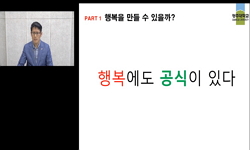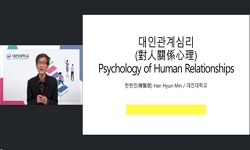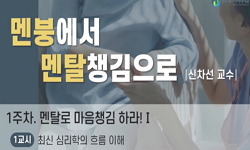The psychological capital is one of an individual's personal assets that Fredrickson(1998) argues are important in our survival. She maintains that frequent experiences of positive emotions such as pleasure, love, peace and satisfaction would first br...
http://chineseinput.net/에서 pinyin(병음)방식으로 중국어를 변환할 수 있습니다.
변환된 중국어를 복사하여 사용하시면 됩니다.
- 中文 을 입력하시려면 zhongwen을 입력하시고 space를누르시면됩니다.
- 北京 을 입력하시려면 beijing을 입력하시고 space를 누르시면 됩니다.

긍정적 정서가 심리적 자본 및 마음챙김에 미치는 영향: 심신수련 프로그램의 효과 = The Influence of Positive Emotion on Psychological Capital and Mindfulness: The Effects of A Mind-Body Training Program
한글로보기https://www.riss.kr/link?id=A104960978
- 저자
- 발행기관
- 학술지명
- 권호사항
-
발행연도
2012
-
작성언어
Korean
- 주제어
-
등재정보
KCI등재
-
자료형태
학술저널
- 발행기관 URL
-
수록면
127-156(30쪽)
-
KCI 피인용횟수
26
- 제공처
-
0
상세조회 -
0
다운로드
부가정보
다국어 초록 (Multilingual Abstract)
The psychological capital is one of an individual's personal assets that Fredrickson(1998) argues are important in our survival. She maintains that frequent experiences of positive emotions such as pleasure, love, peace and satisfaction would first broaden his/her ‘thought-action repertoire’ that in turn lead to build his/her psychological, cognitive, emotional and physical resources. Mindfulness is another kind of mental asset that Fredrickson mentions as a by-product of frequent positive emotions. It is often defined as 'non-judgmental awareness' or 'keeping attention to the present moment experiences with a non-judgmental attitude'. It has been one of the most actively investigated subjects in the recent psychology literatures and consistently related to the physical and psychological illness or wellness variables. For example, mindfulness is associated with lower levels of emotional disturbances (e.g., depressive symptoms, anxiety, and stress), higher levels of subjective well-being (lower negative emotions, and satisfaction with life) and higher levels of eudemonic wellbeing (e.g., self-actualization).
This study has two objectives. First it investigates if a 15 week, 2 credit hour mind-body training program would increase the college students' positive emotions. Second, it tests the validity of the 'Broaden and Build Theory of Positive Emotions'. It examines if the increased positive emotions through the training would gradually build the students' psychological capital and mindfulness.
The mind-body program was designed by the first author of this research by referring to the MBSR(Mindfulness Based Stress Reduction, Kabat-Zinn 1990) and K-MBSR(장현갑 2004). It consists of three parts; 20 minute lecture on positive psychology subjects, 10 minute meditation (mindfulness and loving-kindness), and an hour Kooksundo Danjun Breathing (stretching, Danjun breathing and physical exercises).
Study I was conducted in the fall semester of 2010. The research design was a Before and Post Between Group Difference. The experimental group had 72 students (male 40, female 32) while the control group had 88 students (male 36, female 52). As expected the between group differences were significant (p < .05). Accordingly it was concluded that the mind-body program was effective to increase the positive emotions and to decrease the negative emotions.
Study II was conducted in the fall semester of 2011. The research design was the same as in Study I but there were three observations; the first week of the semester, the 8th week and the 15th week. The number of samples used in the final analysis were 53 (experimental group) and 38(control group). After confirming that the program was effective to increase the positive emotions and decrease the negative emotions of the experimental group, the two hypotheses were tested by applying the LTM (Latent Trajectory Model) and Path Analysis. The data supported the two hypotheses; the increases in both the psychological capital and the mindfulness were followed by the increase in the positive emotions.
This study has two contributions. First it is the first experimental study in Korea to test the theoretical validity of the Broaden and Build Theory of the Positive Emotions. Second, the study shows that a total of 25 hour mind-body training program can increase the participant's psychological capital and mindfulness.
The study has three major limitations. First, a follow-up test after the final measurement was not administered. Second, the participants were students enrolled in the academic course. A future study using a general public is needed. Third, the study did not investigate the program's individual element's effect. For example, it did not try to measure the impact of the instructor. To develop a better training program, a more rigorous study is needed.
국문 초록 (Abstract)
기쁨, 사랑, 평화, 만족과 같은 긍정적 정서가 개인의 심리적, 정서적, 신체적 자원 형성에 미치는 영향에 주목하는 심리학계의 최신 연구들이 경영현장에서 응용되고 있다. 인기를 끌고 있...
기쁨, 사랑, 평화, 만족과 같은 긍정적 정서가 개인의 심리적, 정서적, 신체적 자원 형성에 미치는 영향에 주목하는 심리학계의 최신 연구들이 경영현장에서 응용되고 있다. 인기를 끌고 있는 웃음 치료, 펀 경영과 같은 교육 프로그램들이 그 예라 할 수 있다. 본 연구는 긍정심리학의 주요 주제를 소개하는 강의, 스트레칭 및 명상 실습, 그리고 일상생활에서 긍정정서를 유도 하는 과제로 구성된 매주 1회씩 100분, 총 15회에 걸친 심신수련 프로그램이 대학생들의 긍정적 정서 경험 빈도와 개인적 자원 형성에 미치는 영향을 분석한다. 연구의 근거가 되는 ‘긍정적 정서의 확장-형성 이론’(Fredrickson, 1998; 2001)은 국내에서는 아직 종단적 실험을 통해 검증된 사례가 없다. 본 연구는 두 차례에 걸친 실험조사를 통해 이 이론의 타당성을 확인하고 기업, 학교, 스포츠 단체 등 다양한 조직에서 구성원들의 수행성과(performance)를 높일 수 있는 심신수련 프로그램의 가능성을 탐색해 본다.
참고문헌 (Reference)
1 배재홍, "한국형 마음챙김 명상에 기반한 스트레스감소 프로그램이 대학생의 정서반응에 미치는 영향" 한국건강심리학회 11 (11): 673-688, 2006
2 김수지, "한국형 마음 챙김 명상에 기반한 스트레스 감소 프로그램이 만성통증에 미치는 효과" 한국문화및사회문제심리학회 15 (15): 359-375, 2009
3 권선중, "한국판 마음챙김 주의 알아차림 척도(K-MAAS)의 타당화 연구" 한국건강심리학회 12 (12): 269-287, 2007
4 장재윤, "직무만족과 직무에서 경험하는 정서간의 관계: 빈도 가설과 긍정성 비율 가설의 비교" 한국산업및조직심리학회 23 (23): 275-295, 2010
5 양필석, "심리적 자본이 직무만족 및 조직몰입에 미치는 영향과 내재적 직무동기의 매개효과" 한국인적자원관리학회 18 (18): 149-172, 2011
6 장현갑, "스트레스 관련 질병 치료에 대한 명상의 적용" 한국건강심리학회 9 (9): 471-492, 2004
7 김정호, "삶의 만족 및 삶의 기대와 스트레스 및 웰빙의 관계: 동기상태이론의 적용" 한국건강심리학회 12 (12): 325-345, 2007
8 이철희, "변혁적 리더십과 거래적 리더십이 직무열의에 미치는 영향: 심리적 자본의 매개효과를 중심으로" 한국산업및조직심리학회 25 (25): 147-169, 2012
9 박소희, "멘토링과 신뢰, 조직몰입, 인적자원역량의 관계에 대한 종단 연구: 잠재성장모형을 활용하여" 한국경영교육학회 27 (27): 251-277, 2012
10 김정호, "마음챙김이란 무엇인가 : 마음챙김의 임상적 및 일상적 적용을 위한 제언" 한국건강심리학회 9 (9): 511-538, 2004
1 배재홍, "한국형 마음챙김 명상에 기반한 스트레스감소 프로그램이 대학생의 정서반응에 미치는 영향" 한국건강심리학회 11 (11): 673-688, 2006
2 김수지, "한국형 마음 챙김 명상에 기반한 스트레스 감소 프로그램이 만성통증에 미치는 효과" 한국문화및사회문제심리학회 15 (15): 359-375, 2009
3 권선중, "한국판 마음챙김 주의 알아차림 척도(K-MAAS)의 타당화 연구" 한국건강심리학회 12 (12): 269-287, 2007
4 장재윤, "직무만족과 직무에서 경험하는 정서간의 관계: 빈도 가설과 긍정성 비율 가설의 비교" 한국산업및조직심리학회 23 (23): 275-295, 2010
5 양필석, "심리적 자본이 직무만족 및 조직몰입에 미치는 영향과 내재적 직무동기의 매개효과" 한국인적자원관리학회 18 (18): 149-172, 2011
6 장현갑, "스트레스 관련 질병 치료에 대한 명상의 적용" 한국건강심리학회 9 (9): 471-492, 2004
7 김정호, "삶의 만족 및 삶의 기대와 스트레스 및 웰빙의 관계: 동기상태이론의 적용" 한국건강심리학회 12 (12): 325-345, 2007
8 이철희, "변혁적 리더십과 거래적 리더십이 직무열의에 미치는 영향: 심리적 자본의 매개효과를 중심으로" 한국산업및조직심리학회 25 (25): 147-169, 2012
9 박소희, "멘토링과 신뢰, 조직몰입, 인적자원역량의 관계에 대한 종단 연구: 잠재성장모형을 활용하여" 한국경영교육학회 27 (27): 251-277, 2012
10 김정호, "마음챙김이란 무엇인가 : 마음챙김의 임상적 및 일상적 적용을 위한 제언" 한국건강심리학회 9 (9): 511-538, 2004
11 김정호, "마음챙김과 긍정심리학 중재법의 통합 프로그램을 위한 제언" 한국건강심리학회 15 (15): 369-387, 2010
12 박성현, "마음챙김 척도 개발" 가톨릭대학교 대학원 2006
13 Tan, Chade-Meng, "너의 내면을 검색하라" 시공사 2012
14 오미영, "긍정적 환상 신드롬에 대한 분석 -『시크릿』의 비밀 -" 한국사회역사학회 13 (13): 123-150, 2010
15 김주엽, "긍정심리자본이 조직구성원의 직무만족과 정서적 몰입에 미치는 영향" 한국경영교육학회 26 (26): 117-148, 2011
16 이동섭, "긍정심리자본의 선행요인과 결과에 관한 연구" 한국경영학회 39 (39): 1-28, 2010
17 정대용, "긍정심리자본과 리더십성과" 한국경영교육학회 26 (26): 401-428, 2011
18 이광호, "국선도 단전호흡 수련의 운동효과에 관한 연구(60세 이상 성인병이 있는 고령자를 대상으로)?" 한국체육학회 43 (43): 635-646, 2004
19 Fredrickson, B. L., "What Good are Positive Emotions?" 2 (2): 30-319, 1998
20 Brandt, N., "Wall Street Boses, Tiger Woods Mediate to Focus"
21 Baer, R. A., "Using Self-report Assessment Methods to Explore Facets of Mindfulness" 13 : 27-45, 2006
22 Fredrickson, B. L., "The Role of Positive Emotions in Positive Psychology. The Broaden-and-Build Theory of Positive Emotions" 56 (56): 218-226, 2001
23 Luthans, F., "The Need for and Meaning of Positive Organizational Behavior" 23 (23): 695-, 2002
24 Isen, A. M., "The Influence of Positive Affect on the Unusualness of Word Association" 48 : 1413-1426, 1985
25 Lyubomirsky, S., "The How of Happiness: A Scientific Approach to Getting The Life You Want" Penguine Press 2008
26 Brown, K. W., "The Benefits of Being Present: Mindfulness and Its Role in Psychological Well-being" 84 : 822-848, 2003
27 Avey, J. B., "The Additive Value of Psychological Capital in Predicting Workplace Attitudes and Behaviors" 36 (36): 430-452, 2010
28 Goleman, D., "Social Intelligence: The New Science of Human Relationships" Bantam Books 2006
29 Valentine, S., "Role conflict, mindfulness, and organizational ethics in an education-based healthcare institution" 94 : 455-469, 2010
30 Wright, T. A., "Psychological Well-being and Job Satisfaction as Predictors of Job Performance" 5 (5): 84-94, 2000
31 Luthans, F., "Psychological Capital: Developing the Human Competitive Edge" Oxford University Press 2007
32 Seligman, M. E., "Positive Psychology Progress: Empirical Validation of Interventions" 60 (60): 410-421, 2005
33 Youssef, C. M., "Positive Organizational Behavior in The Workplace: The Impact of Hope, Optimism, and Resiliency" 33 : 774-800, 2007
34 Fredrickson, B. L., "Positive Emotions Speed Recovery From the Cardio-vascular Sequelae of Negative Emotions" 12 : 191-220, 1998
35 Diener, E., "Personality and subjective well-being, In Well-being: The Foundations of Hedonic Psychology" Russell Sage Foundation 213-229, 1999
36 Tellegen, A., "Personali, BSimilarity in Twins Reared Apart and Together" 54 : 1031-1039, 1988
37 Dane, E., "Paying attention to mindfulness and its effects on task perforforce in the workplace" 37 (37): 997-1018, 2011
38 Carver, C. S., "Origins and Functions of Positive and Negative Affect: A Control-Process View, In Motivational Science: Social-personality Perspectives" Psychology Press 19-35, 1990
39 Carver, C., "Optimism, In Handbook of Positive Psychology" Oxford University Press 231-243, 2002
40 Fredrickson, B. L., "Open heart build lives: Positive Emotions, Induced Through Loving-kindness Meditation, Build Consequential Personal Resources" 95 (95): 1045-1062, 2008
41 Lazarus, R. S., "On the Primacy of Cognition" 39 : 124-129, 1984
42 Kahneman, D., "Objective Happiness, In Well-being: The Foundations Of Hedonic Psychology" New York Russell Sage Foundation 3-27, 1999
43 Veenhoven, R., "National Wealth and Individual Happiness, In Understanding Economic Behavior" Kluwer Academic 9-32, 1989
44 Derryberry, D., "Motivating the Focus of Attention, In The Heart's Eye: Emotional Influences in Perception and Attention" Academic Press 167-196, 1994
45 Dhiman, S., "Mondfulness in life & leadership: An exploratory survey" 3 (3): 55-80, 2009
46 Richard M. Ryan, "Mindfulness: Theoretical foundations and evidence for its salutary effects" LAWRENCE ERLBAUM ASSOC INC-TAYLOR FRANCIS 18 (18): 211-237, 2007
47 Bishop, S. R., "Mindfulness: A Proposed Operational Definition" 11 : 230-241, 2004
48 Kabat-Zinn, J., "Mindfulness-Based Interventions in Context: Past, Present, and Future" 10 : 144-156, 2003
49 Shapiro, S. L., "Mechanism of Mindfulness" 62 (62): 373-386, 2006
50 Renninger, K. A., "Individual Interest and Development: Implications for Theory and Practice, In The Role of Interest in Learning & Development" Erlbaum 361-395, 1992
51 Ruedy, N. E., "In the Moment: The Effect of Mindfulness on Ethical Decision Making" 95 : 73-87, 2010
52 Block, J., "IQ and Ego-Resiliency: Conceptual and Empirical Connections and Separateness" 70 : 349-361, 1996
53 Adams V. H., "Hope in the Workplace, In WorkplaceSpirituality & Organization Performance" Sharpe 367-377, 2002
54 Brickman, P., "Hedonic relativism & planning the good society, In Adaptation-level Theory" Academic Press 287-301, 1971
55 Diener, E., "Happiness is The Frequency Not Intensity of Positive Verus Negative Affect, In Subjective well-being: An Interdisciplinary Perspective 1st Edition" Pergamon Press 119-139, 1991
56 Cohn, M. A., "Happiness Unpacked: Positive Emotions Increase Life Satisfaction by Building Resilience" 9 : 361-368, 2009
57 Eid, M., "Global Judgments of Subjective Well-being: Situational Variability and Long-Term Stability" 65 : 245-277, 2004
58 Kabat-Zinn, J., "Full Catastrophe Living: Using the Wisdom of Your Body and Mind to Face Stress, In Pain and Illness" Delacorte 1990
59 Luthans, F., "Experimental Analysis of a Web-based Training Intervention to Develop Positive Psychological Capital" 7 (7): 209-221, 2008
60 Baron, R. A., "Entrepreneurs' Dispositional Positive Affect: The Potential Benefits-and Potential Costs-of Being 'Up'" 27 : 310-324, 2012
61 Lakey, C. E., "Dispositional Mindfulness as a Predictor of The Severity of Gambling Outcomes" 43 : 1698-1710, 2007
62 Helson, H., "Current Trends and Issues in Adaptation-level Theory" 19 : 26-38, 1964
63 Emmons, R. A., "Counting Blessings Versus Burdens: An Experimental Investigation of Gratitude and Subjective Well-being in Daily Life" 84 : 377-389, 2003
64 Diener, E., "Beyond the Hedonic Treadmill: Revising the Adaptation Theory of Well-being" 61 : 305-314, 2006
65 Levenson, R. W., "Automatic Nervous System Differences Among Emotions" 3 : 23-27, 1992
66 Baer, R. A., "Assessment of Mindfulness by Self-report: The Kentucky Inventory of Mindfulness Skills" 11 : 191-206, 2004
67 Carmines, E. G., "Analyzing Models with Unobserved Variables, In Social Measurement: Current Issues" Sage Publications 65-115, 1981
68 Kabat-Zinn, J., "An Outpatient Program in Behavioral Medicine for Chronic Pain Patients Based on The Practice of Mindfulness Meditation: Theoretical Considerations and Preliminary Results" 4 : 33-47, 1990
69 Isen, A. M., "An Influence of Positive Affect on Decision Making in Complex Situations: Theoretical Issues with Practical Implications" 11 (11): 75-85, 2001
70 Amabile, T. M., "Affect and creativity at work" 50 : 367-403, 2005
71 Helson, H., "Adaptation-Level as a Basis for a Quantitative Theory of Frames of Reference" 55 : 297-313, 1948
72 Sheldon, K. M., "Achieving Sustainable New Happiness: Prospects, Practices, and Prescriptions, In Positive Psychology in Practice" John Wiley & Sons 127-145, 2004
73 Basso, M. R., "A neuropsychological theory of positive affect and its influence on cognition" 2 : 249-255, 1996
동일학술지(권/호) 다른 논문
-
- 한국경영교육학회
- 양정영
- 2012
- KCI등재
-
조직 공정성과 자발적 이직의 관계에서 정서적 몰입의 매개효과에 관한 연구
- 한국경영교육학회
- 김정석
- 2012
- KCI등재
-
경영학 교육에서의 액션러닝의 유용성: 자생체계 모형(VSM)에 의한 이중 순환학습 방법을 중심으로
- 한국경영교육학회
- 유재언
- 2012
- KCI등재
-
- 한국경영교육학회
- 장미혜
- 2012
- KCI등재
분석정보
인용정보 인용지수 설명보기
학술지 이력
| 연월일 | 이력구분 | 이력상세 | 등재구분 |
|---|---|---|---|
| 2026 | 평가예정 | 재인증평가 신청대상 (재인증) | |
| 2020-01-01 | 평가 | 등재학술지 유지 (재인증) |  |
| 2017-01-01 | 평가 | 등재학술지 유지 (계속평가) |  |
| 2013-01-01 | 평가 | 등재학술지 유지 (등재유지) |  |
| 2011-01-24 | 학술지명변경 | 한글명 : 경영교육논총 -> 경영교육연구 |  |
| 2010-01-01 | 평가 | 등재학술지 유지 (등재유지) |  |
| 2007-01-01 | 평가 | 등재학술지 선정 (등재후보2차) |  |
| 2006-01-01 | 평가 | 등재후보 1차 PASS (등재후보1차) |  |
| 2005-01-01 | 평가 | 등재후보 1차 FAIL (등재후보2차) |  |
| 2004-01-01 | 평가 | 등재후보 1차 PASS (등재후보1차) |  |
| 2003-01-01 | 평가 | 등재후보학술지 선정 (신규평가) |  |
학술지 인용정보
| 기준연도 | WOS-KCI 통합IF(2년) | KCIF(2년) | KCIF(3년) |
|---|---|---|---|
| 2016 | 1.39 | 1.39 | 1.34 |
| KCIF(4년) | KCIF(5년) | 중심성지수(3년) | 즉시성지수 |
| 1.3 | 1.28 | 1.351 | 0.59 |





 DBpia
DBpia






